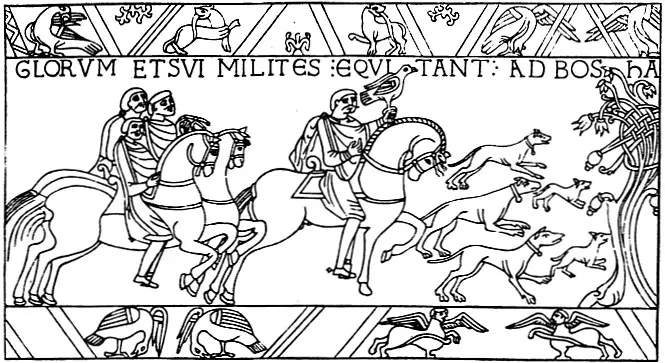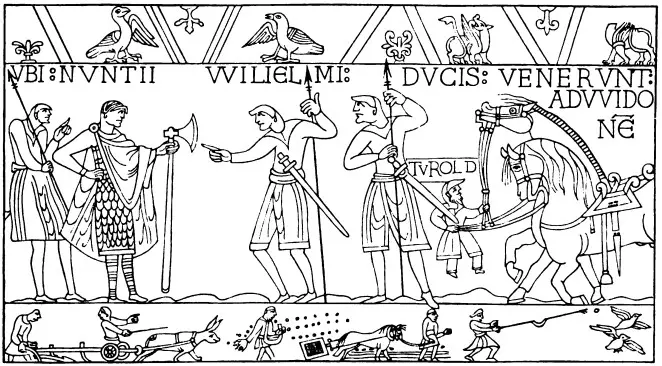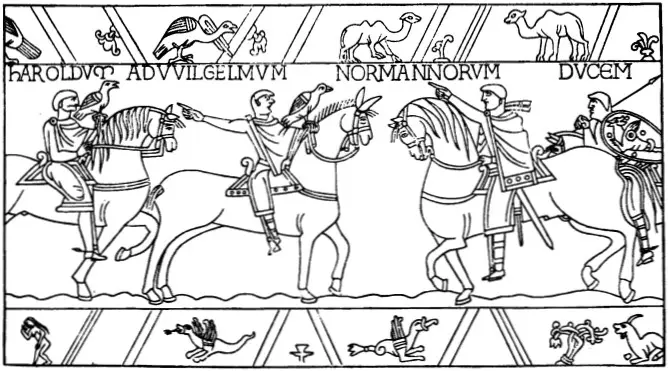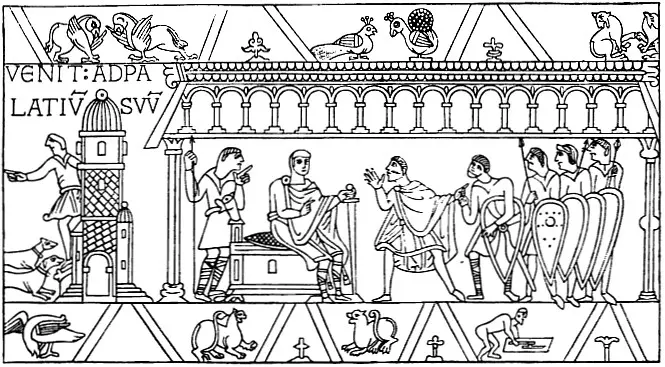Wace - Master Wace, His Chronicle of the Norman Conquest From the Roman De Rou
Здесь есть возможность читать онлайн «Wace - Master Wace, His Chronicle of the Norman Conquest From the Roman De Rou» — ознакомительный отрывок электронной книги совершенно бесплатно, а после прочтения отрывка купить полную версию. В некоторых случаях можно слушать аудио, скачать через торрент в формате fb2 и присутствует краткое содержание. Жанр: foreign_prose, История, foreign_edu, foreign_antique, на английском языке. Описание произведения, (предисловие) а так же отзывы посетителей доступны на портале библиотеки ЛибКат.
- Название:Master Wace, His Chronicle of the Norman Conquest From the Roman De Rou
- Автор:
- Жанр:
- Год:неизвестен
- ISBN:нет данных
- Рейтинг книги:4 / 5. Голосов: 1
-
Избранное:Добавить в избранное
- Отзывы:
-
Ваша оценка:
- 80
- 1
- 2
- 3
- 4
- 5
Master Wace, His Chronicle of the Norman Conquest From the Roman De Rou: краткое содержание, описание и аннотация
Предлагаем к чтению аннотацию, описание, краткое содержание или предисловие (зависит от того, что написал сам автор книги «Master Wace, His Chronicle of the Norman Conquest From the Roman De Rou»). Если вы не нашли необходимую информацию о книге — напишите в комментариях, мы постараемся отыскать её.
Master Wace, His Chronicle of the Norman Conquest From the Roman De Rou — читать онлайн ознакомительный отрывок
Ниже представлен текст книги, разбитый по страницам. Система сохранения места последней прочитанной страницы, позволяет с удобством читать онлайн бесплатно книгу «Master Wace, His Chronicle of the Norman Conquest From the Roman De Rou», без необходимости каждый раз заново искать на чём Вы остановились. Поставьте закладку, и сможете в любой момент перейти на страницу, на которой закончили чтение.
Интервал:
Закладка:

Whatever was the business he went upon, or whatever it was that he meant to do, Harold set out on his way, taking the risk of what might fall out. What is fated to happen no man can prevent, let him be who he will. What must be will come to pass, and no one can make it nought.
He made ready two ships, and took the sea at Bodeham 118 118 Bosham, near Chichester; a manor which Domesday shows to have belonged to Harold's father Godwin. See Ellis, Domesday, i. 310.
. I know not how the mischief was occasioned; whether the steersman erred, or whether it was that a storm arose; but this I know, that he missed the right course, and touched the coast of Pontif, where he could neither get away, nor conceal himself. A fisherman of that country, who had been in England and had often seen Harold, watched him; and knew him, both by his face and his speech; and went privily to Guy, the count of Pontif 119 119 Guy succeeded his brother Enguerran, William's brother-in-law, who was killed before Arques. Guy, after being captured at Mortemer, was, according to Ordericus Vitalis , p. 658, kept prisoner at Bayeux, and was ultimately released on homage and fealty to the duke. See our previous notes on this family, and a subsequent one on Aumale. Benoit states positively that a storm carried Harold to Ponthieu: —trop lor fu la mer sauvage: Kar granz tempers e fort orage Ne les i laissa ariver: Ainceis les covint devaler Dreit en Pontif. La pristrent port, Eissi ateint e eissi mort; Mieux vousissent estre en sezile.
, and would speak to no other; and he told the count how he could put a great prize in his way, if he would go with him; and that if he would give him only twenty livres, he should gain a hundred by it, for he would deliver him such a prisoner, as would pay a hundred livres or more for ranson. The count agreed to his terms, and then the fisherman showed him Harold. They seized and took him to Abbeville; but Harold contrived to send off a message privily to duke William in Normandy, and told him of his journey; how he had set out from England to visit him, but had missed the right port; and how the count of Pontif had seized him, and without any cause of offence had put him in prison: and he promised that if the duke would deliver him from his captivity, he would do whatever he wished in return.
Guy guarded Harold mean time with great care; fearing some mischance, he sent him to Belrem 120 120 Beaurain on the Canche, arrondissement of Hesdin.
, that he might be further from the duke. But William thought that if he could get Harold into his keeping, he might turn it to good account; so he made so many fair promises and offers to the earl, and so coaxed and flattered him, that he at last gave up his prisoner 121 121 According to William of Poitiers , Guy himself conducted his prisoner to William at Eu. Benoit ascribes the surrender to William's threats and military preparations, for which purpose ....manda li dux ses genz Sempres, a milliers e a cenz; Vers Ou chevaucha irascuz Dunt Heraut ne li ert renduz.
; and the duke thus got possession of him, and gave in return to the count Guy a fair manor lying along the river Alne 122 122 The Eaulne.
.


William entertained Harold many days in great honour, as was his due. He took him to many rich tournaments, arrayed him nobly, gave him horses and arms, and led him with him into Britanny—I am not certain whether three or four times—when he had to fight with the Bretons 123 123 'Tales togeder thei told, ilk on a good palfray.' Robert Brunne's Chronicle, quoted in Thierry , i. 250. Benoit de Sainte-More says of this part of the story, Od que li Dux out jostées, Mult granz e mult desmesurées: Por aller essilier Bretons, Vers lui torcenos e felons Qui n'el deignoient sopleier, Le mena od sei osteier; Là fist de lui si grant cherté C'unc tant n'out de sa volunté, Ne fu nul leu mais tant joiz Qu'il cil afaires fu feniz.
. And in the meantime he bespoke Harold so fairly, that he agreed to deliver up England to him, as soon as king Edward should die; and he was to have Ele 124 124 Adela. According to Ordericus Vitalis it was Agatha, another daughter. He adds a pathetic story as to her felling in love with Harold, and dying of grief at her disappointment, and at an attempt made to consign her to a new match with the king of Gallicia. See Maseres's note, p. 103, and Mr. Amyot's dissertation in the Archæologia . The story of her attachment to Harold is rather inconsistent with the date of 1053, usually assigned to William's marriage; as his daughter would not be more than eleven years old at Harold's visit. The date, however, of the marriage is uncertain. See a note in M. Deville's volume on St. Georges de Bocherville . According to Benoit de Sainte-More, it was part of the agreement that Harold should not only have "Aeliz la proz e la sage," but with her "del regne une moitie." Nothing is said by him of any contrivance as to the relics on which the oath was administered. The oath and agreement, as narrated by him, will be found in the appendix I.
, one of William's daughters, for his wife if he would; and to swear to all this if required, William also binding himself to those terms.

To receive the oath, he caused a parliament to be called. It is commonly said that it was at Bayeux 125 125 Ordericus Vitalis fixes the scene at Rouen, and William of Poitiers at Bonneville-sur-Touques. The latter places the event before the expedition to Brittany; which, except on Wace's authority, is not known to have occurred more than once.
that he had his great council assembled. He sent for all the holy bodies thither, and put so many of them together as to fill a whole chest, and then covered them with a pall; but Harold neither saw them, nor knew of their being there; for nought was shewn or told to him about it; and over all was a philactery, the best that he could select; OIL DE BŒF 126 126 Either from its figure or the ornaments upon it.
, I have heard it called. When Harold placed his hand upon it, the hand trembled, and the flesh quivered; but he swore, and promised upon his oath, to take Ele to wife, and to deliver up England to the duke: and thereunto to do all in his power, according to his might and wit, after the death of Edward, if he should live, so help him God and the holy relics there! Many cried "God grant it 127 127 "Ki Dex li dont!" It is unnecessary to observe how variously these events have been told. In the words of William of Malmsbury , 'Lectorem premonitum velim, quod hic quasi ancipitem viam narrationis video, quia veritas factorum pendet in dubio.' The accounts of Thierry, Sir Francis Palgrave, and Depping, may be referred to as those of the latest writers. In Wace we are following the story of a Norman, as told at a Norman court: but on the whole there is little in his history that is at variance with probability, or with the best evidence on the subject. It will be observed that he does not go the full length of some of the Norman historians, in pretending that the English nation gave any formal assent to Edward's views as to the disposition of his kingdom in favour of his kinsman William.
!" and when Harold had kissed the saints, and had risen upon his feet, the duke led him up to the chest, and made him stand near it; and took off the chest the pall that had covered it, and shewed Harold upon what holy relics he had sworn; and he was sorely alarmed at the sight.
Интервал:
Закладка:
Похожие книги на «Master Wace, His Chronicle of the Norman Conquest From the Roman De Rou»
Представляем Вашему вниманию похожие книги на «Master Wace, His Chronicle of the Norman Conquest From the Roman De Rou» списком для выбора. Мы отобрали схожую по названию и смыслу литературу в надежде предоставить читателям больше вариантов отыскать новые, интересные, ещё непрочитанные произведения.
Обсуждение, отзывы о книге «Master Wace, His Chronicle of the Norman Conquest From the Roman De Rou» и просто собственные мнения читателей. Оставьте ваши комментарии, напишите, что Вы думаете о произведении, его смысле или главных героях. Укажите что конкретно понравилось, а что нет, и почему Вы так считаете.












